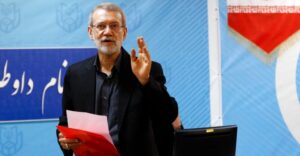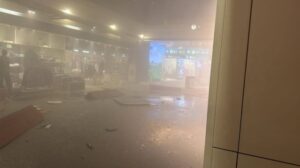“Can an offender also be a poet? A prisoner thinker, a human being with sensitivities, dreams, fears, worries, like everyone else? And can he possibly translate all that into literature?” These questions, posed by the leaders of the creative writing workshop that operates at the Second Chance School (SDE) in the Nigrita Correctional Facility in Serres, have only one answer: that he can, to an extent that deserves the praise and admiration of the people, who, although they are inmates, are experiencing perhaps one of the most creative periods of their lives so far.
The occasion for the communication with the workshop’s leaders, Konstantinos Diogos (Dr. History – Philologist at the Nigrita School of Education) and Maria Kaloupsis (social literacy teacher with Msc Creative Writing), as well as the director of the Nigrita School of Education, Nektaria Tziora, was a special event organized at the imposing Zinzirli mosque in the city of Serres.
Writings of wounded people, full of emotions
The purpose of the event was to present the new poetry collection entitled: “Keep me, you mother” by the incarcerated students of SDE Nigrita, who participated in the creative writing workshop in the school year 2022 – 2023. The event had a special emotional weight. One only had to read the dedication of the publication: “Dedicated to all mothers who have children in prison”, to realize that the texts included in the book have soul power in them.
They are the texts of Dimitri, Spyros, Saimir, Ervis, Minas, Said, Hamid, Nadir, Chinedu, Constantine, Nabil, Hussein, that is, the group of the creative writing workshop for the past school year. These are the writings of people who have managed, with effort, to speak about what hurts them, about what fills them with joy and hope, about their mistakes, about their dreams, about their fears. For feelings, both overt and occult, that as they externalize them through the written word, they feel a sense of relief and at the same time, without realizing it, they become participants in a healing process.
“The creative writing programme started in our school in the spring of 2017”, Nektaria Tziora underlines, speaking to APE-MPA, “in cooperation with the Postgraduate Program of Studies in Creative Writing of the University of Western Macedonia, with Professor Tr. The project is implemented every year with the support of colleagues and volunteers. The program is considered successful as annually around 15 students of the school, both Greek and foreign, express interest in participating and collaborate weekly during the year in a framework of trust, which allows them to freely express their emotional world and, as some of the participants have told us, discover for the first time aspects of themselves and talents they did not know they had.”
A second chance at life and learning
The Nigreta Correctional Facility’s SDE began operation in the 2016 – 2017 school year and is one of 12 SDEs operating in correctional facilities to date. The course of study lasts for two years and its diploma is equivalent to that of high school. Every year about 100 prisoners attend classes at the school. According to the operating regulations of the SDEs, the students attend courses in Greek, English, computer, arithmetic, environment, visual arts, natural and social sciences, and participate in interdisciplinary action plans.
“The objectives of education in prison,” as Ms. Tziora points out, “are: to reduce the consequences of incarceration and to have creative time, to reconnect with the educational process, to improve and certify knowledge and skills, to improve self-esteem, to prepare for life after prison, to reduce recidivism and to acquire employment prospects.”
It should be noted that a total of five collective works by the incarcerated trainees have been published to date. “This year’s publication includes the fruits of the creative writing workshop from last school year as it is not so easy to find the money needed for the publications”, the director of the SDE underlines and adds: “extroversion and partnerships with persons and institutions of the society are necessary to promote the school’s objectives as one of the biggest obstacles on the road to social and professional reintegration is social stereotypes”.
The benefits of creative writing
Creative writing as an artistic form of self-expression contributes to the reconstruction of a positive identity for people belonging to vulnerable social groups. In addition, it helps to alleviate the high level of anxiety and negative emotions due to confinement as well as fostering empathy and cooperation, which in turn help in cultivating communication skills and assuming an attitude of responsibility.
“Through poetic creation, our students,” Ms. Kalouptsi told the AP-MPA, “come face to face with the depths of their souls, confront their ‘demons’, especially drugs, delinquency and their relations with the outside world and the family environment, themes that constantly recur in their texts. They express their truth through the poems, create a new contract with themselves and promise to change their lives. Their cry for a second chance is both sincere and deafening. Everyone deserves a second chance. For them, education is a first ticket to a new life. But the second ticket must be given by society, in the way it treats them and welcomes them back.”
“This year,” continues the director of the SDE, “our workshop was particularly creative. I single out our participation in the 1st International Poetry Festival of Serres. It is also worth mentioning that the poem “Father” by one of our students won the 2nd prize in the 23rd literary competition of the Keratsini Society of Arts, Science and Culture, while two more poems by our students won praise in the same competition.”
K. Diogo: “We don’t treat our students as criminals”
“A basic principle for all the teachers who teach at the Nijrita SDE,” Dr. Konstantinos Diogo stresses, “is that we do not treat our students as criminals, but as people with enormous positive capital, who for various reasons – social, economic, political or personal – have not been able to make use of it. Therefore, through our actions we try to help them discover this forgotten capital and use it for the positive transformation of their personality. Creative writing is a window of freedom and personal expression for incarcerated students, it stimulates confidence, self-confidence and self-esteem. Thus, it becomes a tool for self-improvement and ultimately contributes to the student’s rehabilitation.”
But beyond the literary effect of the poems, which really surprises the reader who decides not just to read the students’ poetic works, but to delve into them, creative writing is transformed into a therapeutic act.
“When society reads the poems of prisoners, it realises that it is dealing with people with emotional richness. And so, little by little, the stereotype of the criminal is shattered and with it the stigma is shattered. This “indelible sentence” is the greatest burden our students face when they are released from prison. Poetry, therefore, besides being a therapy, becomes a tool for reintegration, which is the ultimate goal of school in prison.”
Diogo aptly concludes.
Ask me anything
Explore related questions





